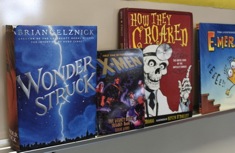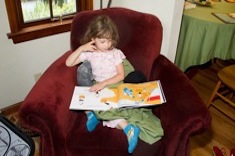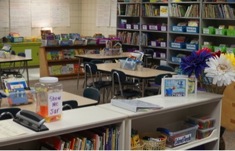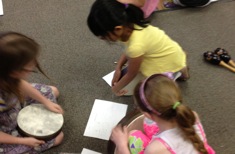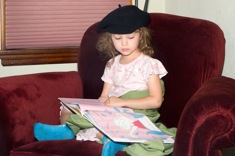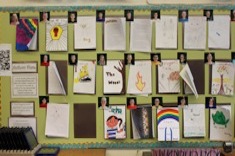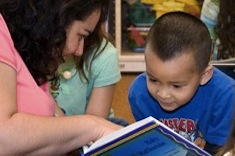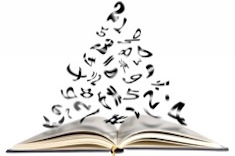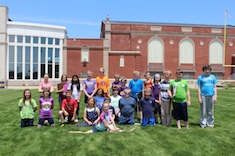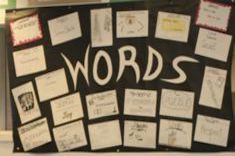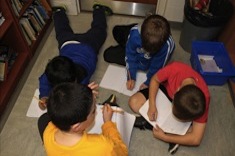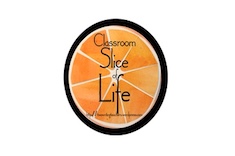Articles
Here is where you’ll find all the latest print features from our contributors. If you’d like to browse specifically by grade level, topic, or contributor, you can use the links in the right sidebar.
Latest Content
Word Nerds
What words are worthy of study? Amanda Adrian and Heather Rader explore that question with colleagues.
Books and Organization of the Classroom Library (Classroom Design Series Part 4)
Ann Marie Corgill’s classroom design series concludes with ideas for organizing classroom libraries and a self-reflection tool for thinking through your classroom design.
Recommendations for Summer Reading Fun: Early Reader Chapter Books for Boys
Meghan Rose and Ruth Shagoury finish their summer fun for early readers series with a booklist for boys interested in chapter books.
Reflecting All Year Long
Katherine Sokolowski finds the impulse for reflection is strong at the start of summer, but reflection works best when it’s built into routines all year long.
Recommendations for Summer Reading Fun: Comics and Graphic Novels for Early Readers
Early readers love comic books and graphic novels. Meghan Rose and Ruth Shagoury give their top picks in their latest summer fun for early readers booklist.
Values and Design (Classroom Design Series Part 2)
Ann Marie Corgill continues her design series, considering the connection between classroom design and values.
Literacy in the Music Room: A Sequence of Lessons
Jennifer Schwanke describes the work of a music teacher who integrates literacy learning into her curriculum.
Recommendations for Summer Reading Fun: Classic Books for Early Readers
Meghan Rose and Ruth Shagoury have written a series of booklists for early readers, perfect for sharing with parents looking for suggestions. The first installment tackles the classic books many of us cherish from our own childhood days.
Starting with Why (Classroom Design Series Part 1)
Ann Marie Corgill's classroom design series takes you through her process of redesigning a classroom. In the first installment, Ann Marie explains how her designs have become less cutesy and more student-centered over time.
The Cure for Senioritis? Poetry!
There may be a group of students somewhere less eager to learn than a class of high school seniors during the last weeks of school, but that group would be as tough to find as Bigfoot or the Loch Ness monster. Gretchen Schroeder discovers a surprising cure for senioritis —modern poetry.
Staying Connected with Students All Summer Long
Cathy Mere explains how she uses technology to stay in touch with students and families over the summer.
Summer Reading Round-Up (Part 2)
Here is the second installment of our round-up of summer reading choices by contributors.
13 Ways to Raise Students Who Hate Research
Chris Lehman has tongue-in-cheek suggestions for helping students learn to hate the research process.
Launching a Fiction Writing Unit with Fifth Graders
Katherine Sokolowski finds late in the year is the perfect time for launching a fiction writing unit with her fifth graders.
What Can Charlie Do?: The Value of Response Journals in Preschool Classrooms
Kelly Petrin shares the power of response journals with preschoolers.
Summer Reading Round-Up (Part 1)
Our contributors share what's in their reading stack this summer.
Independent Reading By the Numbers Is NOT Text Complexity
How do you guide students to select books for independent summer reading? Aimee Buckner challenges teachers who are requiring middle students to pick books based solely on Lexile scores.
Football Field Writing
Katherine Sokolowski adapts an idea from Jim Burke to get her fifth graders outdoors and envisioning their growth over the summer.
Death in Books: Finding Our Way After Loss
Books can help children deal with the toughest challenges in life. In a new booklist, Andie Cunningham shares her top picks for stories about characters grappling with the death of a loved one.
Grouping Struggling Students for Word Study: A Case Study
Shari Frost considers the “go-to” instructional strategy for struggling readers, word study, and explores how to make it work well in a case study of a third-grade group.
Using Shared Writing to Build Argument Skills
Shari Frost explains the power of shared writing in intermediate classrooms, especially for struggling learners.
Madness, the Spring Slump, and High School Readers
Are your adolescent readers present in body but not necessarily in spirit by springtime? We've featured the "book madness" bracket activity in the past for elementary students. Gretchen Schroeder finds the ranking, competition, and passionate discussion about favorite books is just what her high school students need to get their heads back in the reading game.
Our Favorite Online Reading and Writing Tools Round-Up (Part 2)
Choice Literacy contributors share favorite online tools. This is the second installment in a two-part series.
Subheading Literacy: Nothing “Sub” About It
Heather Rader discovers subheadings are a neglected but useful tool for teaching students about key topics in their writing.
They Can Sing and Define It, But Can They Use It?
Melissa Styger rethinks the way she teaches reading strategies, emphasizing putting them to use over defining them.
Our Favorite Online Reading and Writing Tools Round-Up (Part 1)
Choice Literacy contributors share their favorite online reading and writing tools. This is the first installment in a two-part series.
Do You Have Any Questions? Conferring with Families
We've all experienced that moment in a parent conference. You finish your spiel, which includes assessment data, charts, and an anecdote or two about the child. And when you're finished, the parent asks, "But how is my child doing?" Melissa Kolb explores the reasons why there can be a mismatch between our sense of useful information in parent conferences and a parent's expectations.
Cooking Up Interest in Words with Fifth Graders
Maria Caplin continues her series on sparking vocabulary learning, this time highlighting fun activities.
Slice of Life: Challenging Student Writers
Katherine Sokolowski brings the popular web “slice of life” challenge to her fifth-grade classroom.
Keeping Track of Questions
Andie Cunningham observes a third-grade teacher as she systematically improves the quality and depth of student questioning over time.
Browse Content By
Type
Category
- Assessment Tools
- Big Fresh Archives
- Booklists
- Choice Numeracy
- Classroom Design
- Common Core
- Community Building
- Conferring
- Content Literacy
- Digital Literacy
- English Language Learners
- Equity
- Family Relations
- Free Samples
- Guiding Groups
- Leadership
- Literacy Coaches
- Mentor Texts
- Minilessons
- New Teacher Mentors
- Podcasts
- Poetry
- Quote Collections
- Reading Strategies
- Self Care
- Struggling and Striving Learners
- Talking and Listening
- Teacher Study Groups
- Teaching Reading
- Teaching Writing
- Word Study and Vocabulary
Author
- Melissa Quimby
- Nawal Qarooni
- Gwen Blumberg
- Julie Cox
- The Lead Learners
- Hannah Tills
- Josie Stewart
- Ruth Metcalfe
- Mallory Messenger
- Becca Burk
- Jodie Bailey
- Vivian Chen
- Mary Brower
- Tiffany Abbott Fuller
- Stephanie Affinito
- Ruth Ayres
- Leigh Anne Eck
- Heather Fisher
- Shari Frost
- Julie Johnson
- Suzy Kaback
- Gigi McAllister
- Shirl McPhillips
- Melanie Meehan
- Cathy Mere
- Debbie Miller
- Tara Barnett and Kate Mills
- Tammy Mulligan
- Dana Murphy
- Bitsy Parks
- David Pittman
- Brenda Power
- Heather Rader
- Matt Renwick
- Mandy Robek
- Christy Rush-Levine
- Gretchen Schroeder
- Jen Schwanke
- Brian Sepe
- Katherine Sokolowski
- Stella Villalba
- Jennifer Vincent
Grade Level
Choice Literacy Membership
Articles
Get full access to all Choice Literacy article content
Videos
Get full access to all Choice Literacy video content
Courses
Access Choice Literacy course curriculum and training



